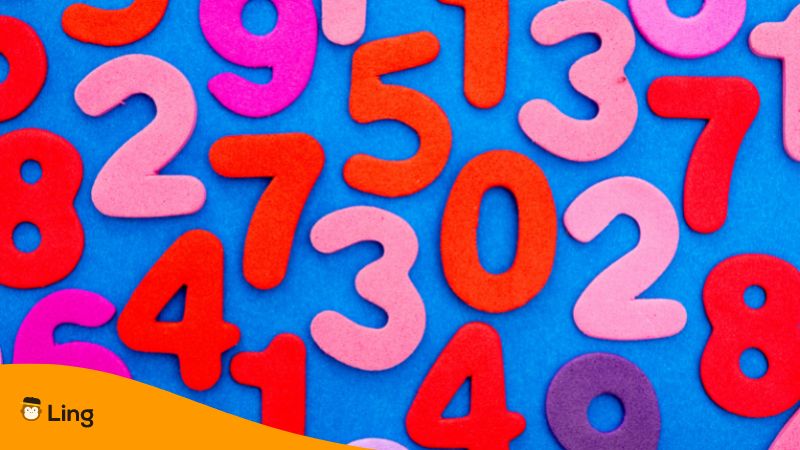Numbers in Greek are a little different from other European countries, so it is essential to know how to do it before heading to Greece. In this guide, I’m going to explain everything you need to know for you to be a pro at counting in this incredible language! Keep reading below!
Knowing how to count in a new language is fundamental if you want to blend in easily with the locals and appreciate better their native language. Of course, having an understanding of how this goes will help you break down language barriers and ensure that you are giving a clear message. With a few numbers on the tip of your tongue, you can ask for prices, order food, or even tell your address.
Numbers in Greek have changed a lot over the years. While initially, the original Greek numbering system was based on ancient Greek and alphabet letters instead of numbers, as centuries passed, Greek started to use the Hindu-Arabic numeral system that is still being used today. So how do Greeks count and write cardinal numbers? Let’s find out!
Numbers From 0 To 9 In Greek

Let’s start with the most simple numbers and the Greek numerals you’ll most frequently use. In the following list are Greek numbers written from 0 to 10 for you to learn and practice.
- 0 – μηδέν (midén)
- 1 – ένα (éna)
- 2 – δύο (dío)
- 3 – τρία (tría)
- 4 – τέσσερα (tésera)
- 5 – πέντε (pénde)
- 6 – έξι (éxi)
- 7 – επτά (eptá)
- 8 – οκτώ (októ)
- 9 – εννέα (enéa)
Keep these numbers in mind as they will be used in addition to other prefixes and suffixes to form the remaining numbers in the Greek language.
Numbers From 10 To 99 In Greek
Next, let’s learn how to count from 10 to 19. All these numbers consist of one single word. To make this word, the rule in Greek is pretty straightforward: the prefix will indicate the first digit, and the suffix will denote the second digit. Sounds simple right?
Let’s look at some examples:
- 10 – δέκα (déka)
- 11 – έντεκα (éndeka)
- 12 – δώδεκα (dódeka)
- 13 – δεκατρία (dekatría)
- 14 – δεκατέσσερα (dekatésera)
- 15 – δεκαπέντε (dekapénde)
- 16 – δεκαέξι (dekaéxi)
- 17 – δεκαεπτά (dekaeptá)
- 18 – δεκαοκτώ (dekaoktó)
- 19 – δεκαεννέα (dekaenéa)
Well, hold on, didn’t I say that they all followed the rule? As any rule has exceptions, the first exceptions appear right at the beginning with the έντεκα (éndeka) and δώδεκα (dódeka), which don’t follow the aforesaid rule.
After 19, one big change occurs: every number greater than 20 consists of two words instead of just one. The first word indicates the first digit and the second word, which will be the basis for the second digit. For example, the number 21 is είκοσι ένα (íkosi éna), and 22 is είκοσι δύο (íkosi dío). Do you see a pattern? Yes! Here, είκοσι (ikosi) is used to indicate numbers in the 20s, and the second word is simply the second digit. Pretty simple, right?
Let’s take a look at these words:
- 20 – είκοσι (íkosi)
- 30 – τριάντα (triánda)
- 40 – σαράντα (saránda)
- 50 – πενήντα (penínda)
- 60 – εξήντα (eksínda)
- 70 – εβδομήντα (evdomínda)
- 80 – ογδόντα (ogdónda)
- 90 – ενενήντα (enenínda)
In these words, the second digit that is 0, or μηδέν (midén), isn’t pronounced in the Greek numbers. If, for example, you wanted to say the number 48, you would say σαρανταοκτώ (sarantaoktó) where you would add the prefix σαράντα (saránda) for 40 and οκτώ (októ) for 8.
Numbers Up To 1000 In Greek
Are you feeling confused already? Good news: for numbers from 100 to 1000, the rule is the same, you have to know how to pronounce the hundreds, and you’re ready to say the words.
- 100 – εκατό(ν) (ekató(n))
- 200 – διακόσια (diakósia)
- 300 – τριακόσια (triakósia)
- 400 – τετρακόσια (tetrakósia)
- 500 – πεντακόσια (pendakósia)
- 600 – εξακόσια (exakósia)
- 700 – επτακόσια (eptakósia)
- 800 – οκτακόσια (oktakósia)
- 900 – εννιακόσια (eniakósia)
- 1000 – χίλια (hília)
Now, for numbers in the hundreds place, the only change you need to introduce to your numbers is the word indicating the correct hundred. Quick note: the number 100, or εκατό (ekató), is the only number where the small letter ν (n) is not included.
- 100 – εκατό (ekató)
- 101 – εκατόν ένα (ekatón éna)
- 102 – εκατόν δύο (ekatón dío)
- 103 – εκατόν τρία (ekatón tría)
- 104 – εκατόν τέσσερα (ekatón tésera)
So, let’s now look at one example. Imagine you wanted to say the number 492. How would you say it? So let’s break it down, 400 is τετρακόσια (tetrakósia), 90 is ενενήντα (enenínda), and 2 is δύο (dío), so the final number would be:
τετρακόσια ενενήντα δύο (tetrakósia enenínta dío)
Other Number-Related Vocabulary

Ordinal Numbers In Greek
Ordinal numbers in Greek are said as following:
- 1st – πρώτος / -η / -ο (prótos / -i / -o)
- 2nd – δεύτερος (défteros)
- 3rd – τρίτος (trítos)
- 4th – τέταρτος (tétartos)
- 5th – πέμπτος (pémptos)
- 6th – έκτος (éktos)
- 7th – έβδομος (évdomos)
- 8th – όγδοος (ógdoos)
- 9th – ένατος (énatos)
- 10th – δέκατος (dékatos)
- 11th – ενδέκατος (endékatos)
- 12th – δωδέκατος (dodékatos)
- 20th – εικοστός (ekatostós)
- 22nd – εικοστός δεύτερος (ekatostós défteros)
- 30th – τριακοστός (triakostós)
- 40th – τεσσαρακοστός (tesarakostós)
- 50th – πεντηκοστός (pendikostós)
- 60th – εξηκοστός (exikostós)
- 70th – εβδομηκοστός (evdomikostós)
- 80th – ογδοηκοστός (ogdoikostós)
- 90th – ενενηκοστός (enenikostós)
- 100th – εκατοστός (ekatostós)
Let’s look at one example and write the ordinal number 136th. Following the rule mentioned above, this number in Greek would be Εκατόν τριάντα έκτο (Ekatón triánta éktó). Similar to ordinal numbers, the first word indicates the first digit, the second word indicates the second digit, and so on.

Learn Greek With Ling App
Pssst, I have some news for you! I have the perfect place for you to increase your linguistic knowledge!
Let me present to you: Ling App – an amazing language-learning resource that will help you master not only Greek but 60+ other available languages from all around the world. This application is equipped with unique and practical activities, fun mini-games, and challenging quizzes that make learning a new language a fun and hassle-free experience. It also has also a chatbot where you can practice your conversational skills anytime!
Download it on App Store or Google Play and start learning Greek today!


































































